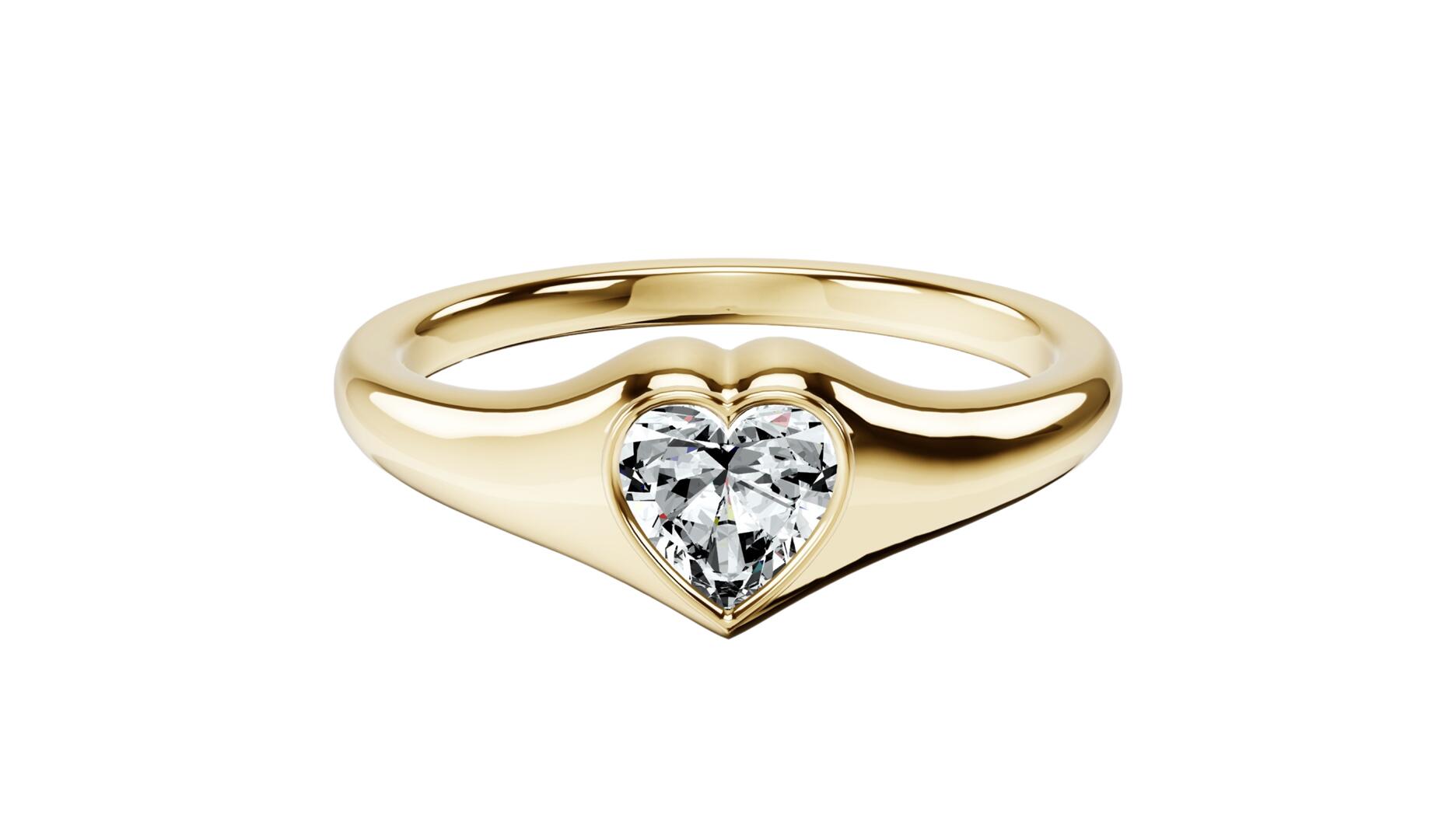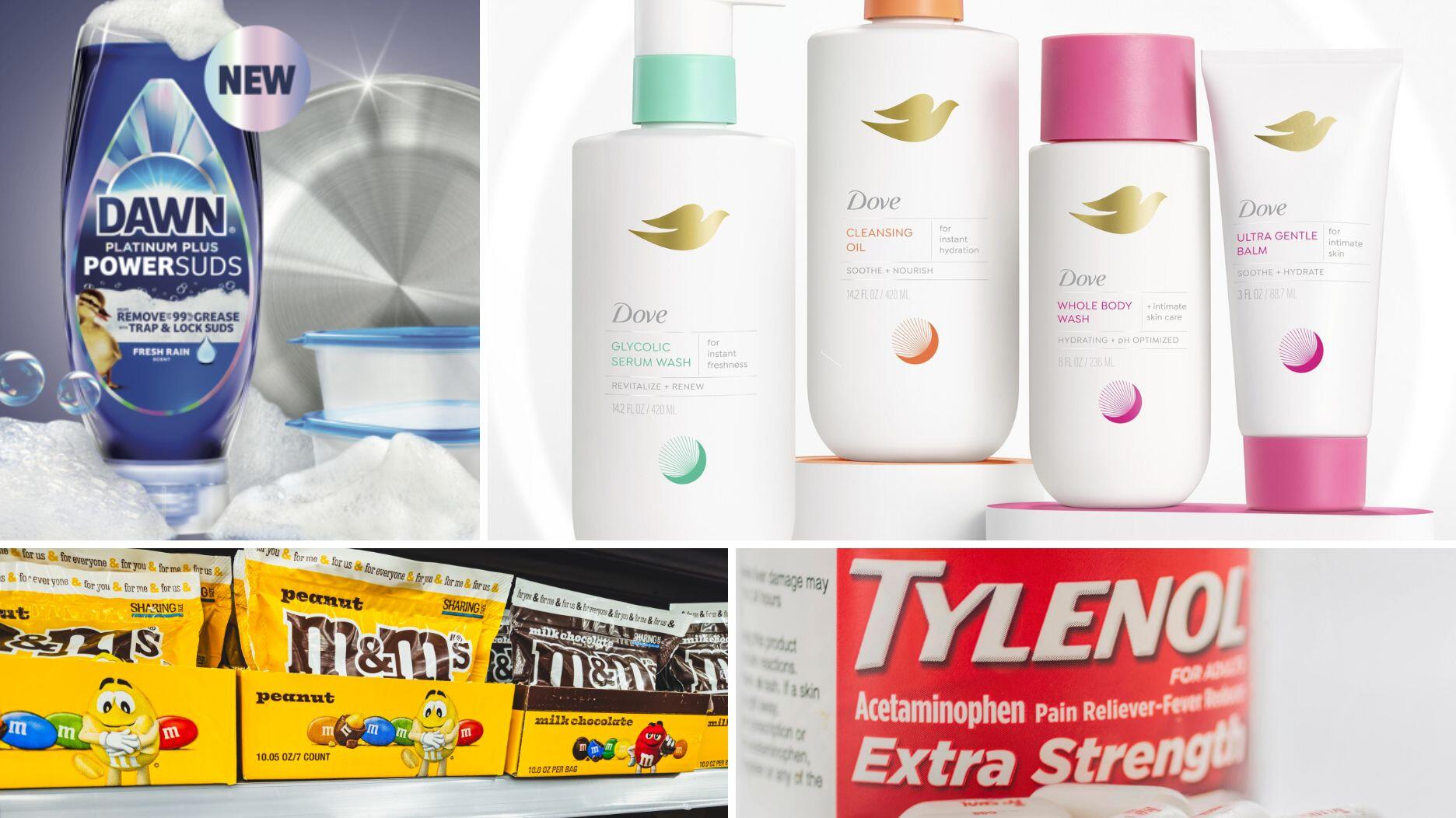Guthrie, the mother of “Today” show host Savannah Guthrie, was abducted just as the Tucson gem shows were starting.
Employees Say Jewelry Industry Has Work to Do on Diversity
National Jeweler breaks down the results of its recent employee-focused survey on diversity, which paints a different picture than the survey taken by employers.

Across the board, employees gave their companies lower marks than employers when it comes to addressing issues of racial justice and equity, and having racially diverse staffs.
Employees also expressed dissatisfaction with how their employers handled incidences of racial discrimination when they were reported.
And, some respondents reported overhearing racist remarks in the workplace or seeing racist content on social media.
RELATED CONTENT — Diversity, Equity and Inclusion: Why They Matter
It is not surprising, then, that a number of survey-takers described the fine jewelry industry in the United States as one that feels insular and closed off to “outsiders.”
For those “outsiders” who do make it in, there was a recurring theme among respondents—even at companies where there is diversity, there are very few, if any, people of color in higher-ranking positions.
All you have to do to understand the lack of diversity, respondents said, is look around the next time you’re at a trade show.
“There is so much bias in how our industry perceives people of color; I’ve experienced it at trade shows,” one respondent, who identified as multiracial or biracial, wrote. “Retailers may assume you can’t afford a piece or that you don’t have the proper knowledge. I constantly feel like I have to prove myself and I can’t be myself (talk or dress how I want) because I won’t be viewed as professional.”
She continued: “Also, almost every piece of material that is used in jewelry is first touched (from the moment it’s taken out of the ground) by a Black or Brown person and that’s not acknowledged. The times that it is, it is in relation to poor mining practices.”
The View Not From the Top
National Jeweler and Jewelers of America fielded the “Diversity in the Fine Jewelry Industry” survey in fall 2020 to better understand the experiences of people of color—particularly Black professionals—in the U.S. fine jewelry industry.
The survey had three segments: one for self-employed individuals, one for employees, and one for employers, the results of which National Jeweler published last month.
As with the employer-focused survey, the majority of respondents (66 percent) to the employee-directed survey were white.
Yet the employee results were more mixed than the employer survey and painted a picture of an industry
In the employer-directed survey, the mostly white field of respondents gave themselves high marks for diversity and inclusion.
Overall, 71 percent of employers ranked themselves as “very good” overall on matters of racial justice and equity. Only 6 percent said their company was doing a “poor” job in this area and less than 1 percent ranked their companies as “very poor.”
Employees, however, see things differently (see chart below).
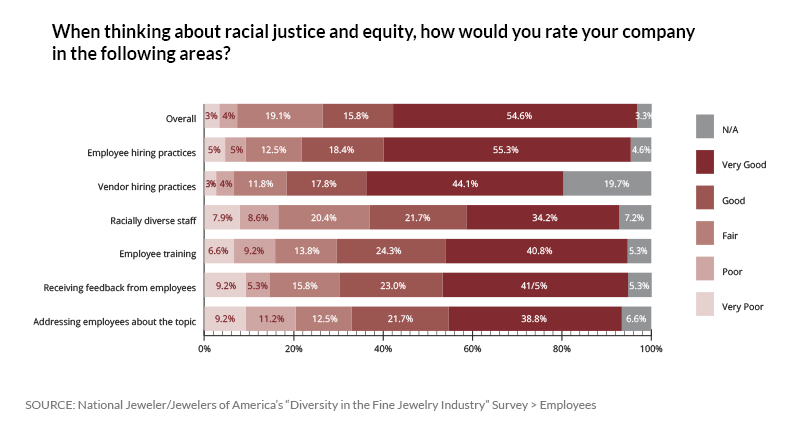
When asked the same question, only about half (55 percent) of jewelry industry employees ranked their company as “very good” overall when it comes to racial justice and equity, and a quarter of respondents said their company was “fair” (19 percent), “poor” (4 percent), or “very poor” (3 percent).
Employees gave their companies the lowest marks for staff diversity, with 37 percent rating their company as “fair” (20 percent), “poor” (9 percent), or “very poor” (8 percent) in this area.
And even in companies where there is some diversity, a number of respondents said it does not extend to the upper ranks of the organization.
A couple survey-takers said their companies had Hispanic employees but they worked in gardening, housekeeping or in the factory.
One respondent said their company “completely lacks representation of people of color in the corporate offices, across all functions.”
Another wrote: “In a previous place of employment, I [heard] racist jokes and comments, and noticed that all employees of non-white racial backgrounds were relegated to lower-paying roles and never considered for promotions.”
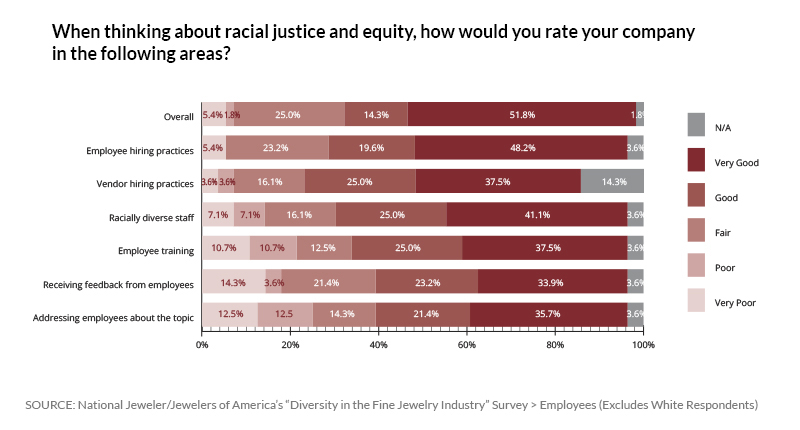
For survey-takers who identified as people of color, the percentage who ranked their company as “very good” in matters of race and equity dropped to 52 percent while 32 percent said their company is “fair” (25 percent), “poor” (2 percent) or “very poor” (5 percent).
One employee who rated their company as “fair” explained they chose that ranking “because we are now starting to be serious about diversity and inclusion though we have talked about it for years.”
Another wrote: “I think that there are very few, if any, companies that are doing a good job and are only looking to do so now because of optics.”
Employees of color in the fine jewelry industry gave their employers the lowest marks for having a diverse staff, with 46 percent of respondents ranking their company as fair, poor or very poor in this area, addressing employees about racial justice and equity (40 percent), and receiving employee feedback on racial issues (39 percent).
Employer Inaction
Half of survey-takers are aware of race-based discrimination in the jewelry industry—whether at their current company, a past company or other companies in the jewelry industry (see chart below)—and the vast majority said their employers did nothing to address the problem.
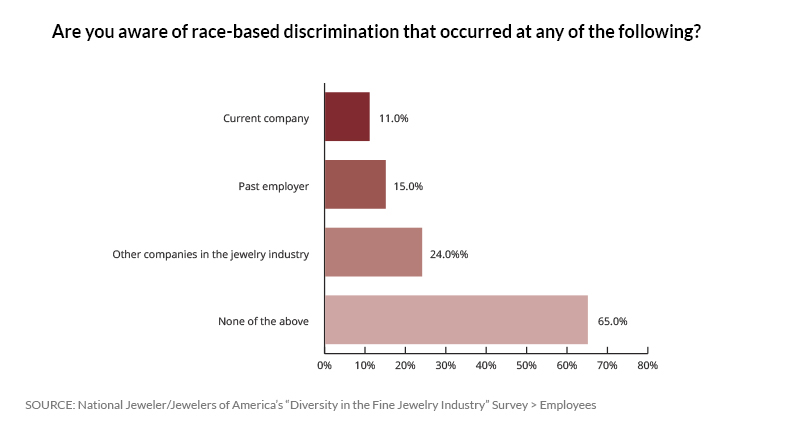
Among respondents of all races, 51 percent said they are aware of race-based discrimination at either the company they currently work for (22 percent), their past employer (15 percent) and/or other companies in the jewelry industry (25 percent).
For employees of color, that number is 58 percent: 22 percent at their current company, 11 percent at past employer, and/or 25 percent at other companies in the jewelry industry.
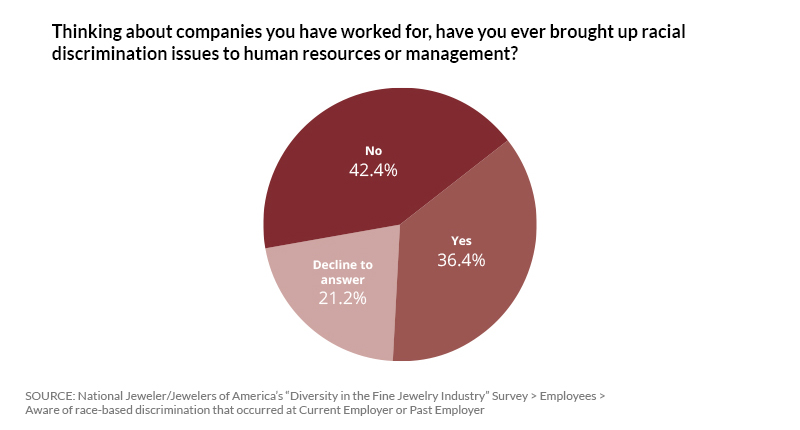
Employees of color were more likely to report issues of racial discrimination to higher-ups, with 75 percent of respondents of color saying they have made HR or upper management aware there were company issues, compared with just 36 percent of all employees (see chart above).
And almost nobody, whether a person of color or white, was satisfied with how the situation was handled.
Eighty-four percent of all respondents said they were dissatisfied (42 percent) or very dissatisfied (42 percent) with how management dealt with racial discrimination—mostly because it was not addressed at all, survey-takers said.
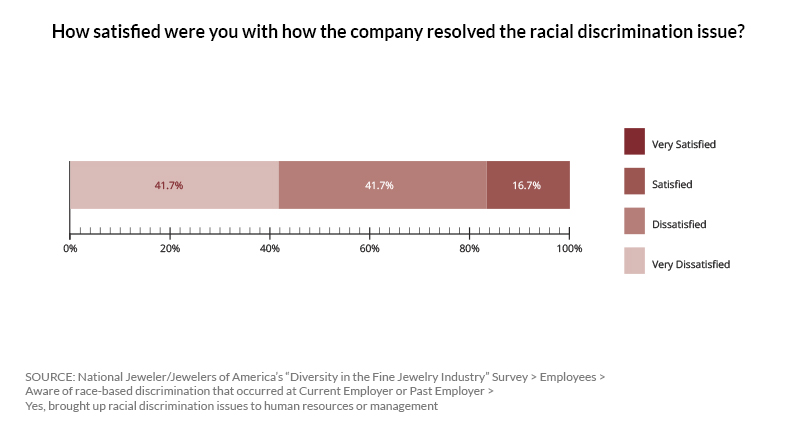
One Black respondent said their past employer simply paid employees to leave and never directly addressed racist behavior.
A few respondents noted that discrimination and racist behavior spills out from the workplace and onto social media, where racially insensitive—and even outright racist—comments are posted on sites like Facebook.
“I’ve overheard racially insensitive conversations, also witnessed (and screen-shotted) overtly racist comments on [a popular Facebook group for jewelers],” a survey-taker, who identified as Black, wrote.
Another respondent, who identified as white, put it bluntly: “Read the social media posts in many of the industry-focused groups. Lots of racists in our industry.”
Help Needed
Nearly 60 percent of survey-takers, regardless of race, agree—the jewelry industry does not do enough to make Black employees feel accepted.
In addition, 77 percent said the jewelry industry is no better (43 percent), worse (24 percent) or much worse (10 percent) than other industries at supporting Black employees.
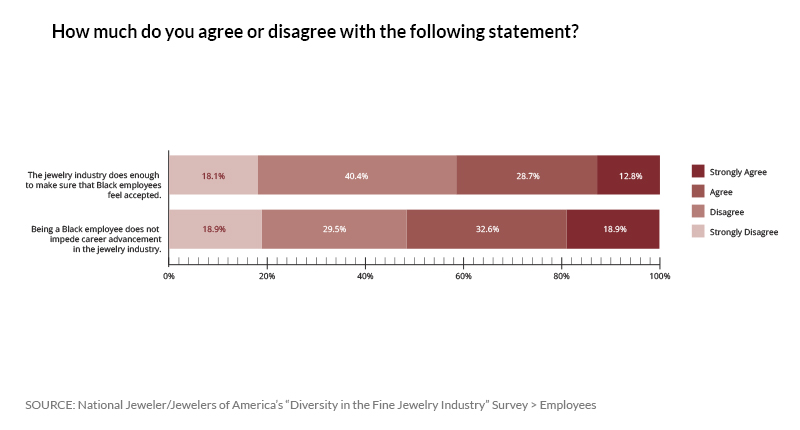
It was in response to this question that many survey-takers commented on the “insular” nature of the industry and how the lack of diversity is readily visible.
“There are hardly any people of color in the industry,” one white respondent wrote. “I look around at trade shows and see barely any people of color. It is so homogenous! We need to get more diverse!”
RELATED CONTENT: This New Group Aims to Support Black Jewelry Professionals
A handful of survey-takers offered suggestions when asked what resources were needed to better support Black employees.
They included: working with a diversity, equity and inclusion consultant; recognition of racist behavior by both employees and customers; mentors who can coach and guide; more diversity at the executive, senior and mid-level management positions; and recruitment and training so the jewelry industry better reflects the demographics of the nation.
One survey-taker wrote that there needs to be a “proper way for employees to voice their concerns and experience, where they are truly heard and seen.”
“I think oftentimes companies look at the demographics of where they are based to decide if they have enough ‘representation’, but they need to start looking at the nation’s demographics.”
Who Answered
National Jeweler and Jewelers of America’s “Diversity in the Fine Jewelry Industry” survey was made available to take between Sept. 23 and Oct. 14.
A total of 814 qualified individuals responded: 473 who were classified as employers, 200 who were classified as employees, and 141 self-employed individuals.
This story analyzed the results of the employee-directed survey. The results of the employer-directed survey were published on National Jeweler last month.
The vast majority of employees who took the survey (78 percent) said they work for retail stores (53 percent), wholesale jewelry companies (13 percent) or manufacturers (12 percent).
For the most part, these companies employ between 2 and 25 people (52 percent), 26 to 50 people (13 percent) or more than 2,500 people (10 percent).
About 64 percent of employee respondents said they are on the manager level at their respective firms (meaning they have direct reports) while the remaining 36 percent do not.
More women than men (74 percent vs. 24 percent) answered the employee-directed survey, with 2 percent choosing “other” when asked for their gender.
The full results of both surveys are available on Jewelers.org.
The Latest

Butterfield Jewelers in Albuquerque, New Mexico, is preparing to close as members of the Butterfield family head into retirement.
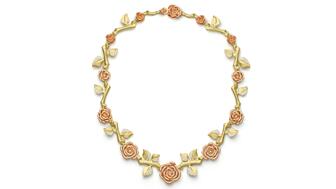
Paul Morelli’s “Rosebud” necklace, our Piece of the Week, uses 18-karat rose, green, and white gold to turn the symbol of love into jewelry.
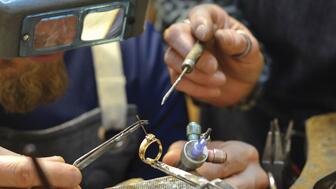
Launched in 2023, the program will help the passing of knowledge between generations and alleviate the shortage of bench jewelers.

The nonprofit has welcomed four new grantees for 2026.


Parent company Saks Global is also closing nearly all Saks Off 5th locations, a Neiman Marcus store, and 14 personal styling suites.
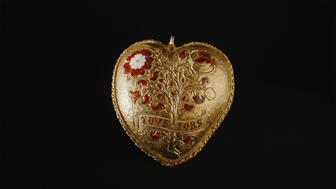
It is believed the 24-karat heart-shaped enameled pendant was made for an event marking the betrothal of Princess Mary in 1518.

Criminals are using cell jammers to disable alarms, but new technology like JamAlert™ can stop them.
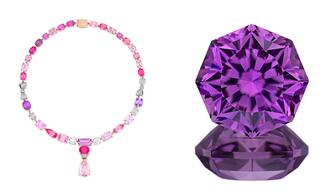
The AGTA Spectrum and Cutting Edge “Buyer’s Choice” award winners were announced at the Spectrum Awards Gala last week.
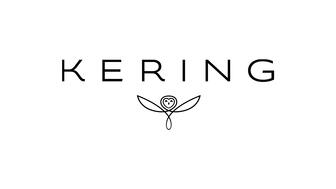
The “Kering Generation Award x Jewelry” returns for its second year with “Second Chance, First Choice” as its theme.
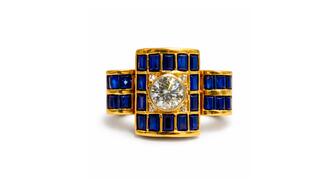
Sourced by For Future Reference Vintage, the yellow gold ring has a round center stone surrounded by step-cut sapphires.
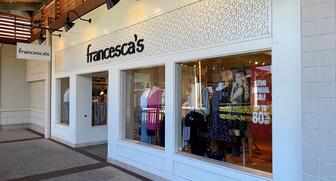
The clothing and accessories chain announced last month it would be closing all of its stores.

The “Zales x Sweethearts” collection features three mystery heart charms engraved with classic sayings seen on the Valentine’s Day candies.

The event will include panel discussions, hands-on demonstrations of new digital manufacturing tools, and a jewelry design contest.

Registration is now open for The Jewelry Symposium, set to take place in Detroit from May 16-19.

Namibia has formally signed the Luanda Accord, while two key industry organizations pledged to join the Natural Diamond Council.

Lady Gaga, Cardi B, and Karol G also went with diamond jewelry for Bad Bunny’s Super Bowl halftime show honoring Puerto Rico.
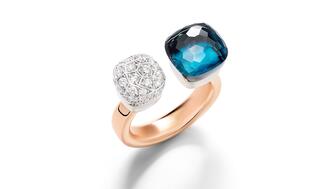
As star brand Gucci continues to struggle, the luxury titan plans to announce a new roadmap to return to growth.
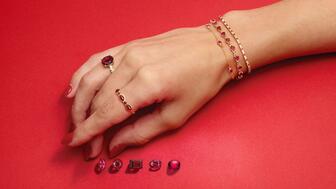
The new category asks entrants for “exceptional” interpretations of the supplier’s 2026 color of the year, which is “Signature Red.”

The White House issued an official statement on the deal, which will eliminate tariffs on loose natural diamonds and gemstones from India.

Entries for the jewelry design competition will be accepted through March 20.

The Ohio jeweler’s new layout features a curated collection of brand boutiques to promote storytelling and host in-store events.
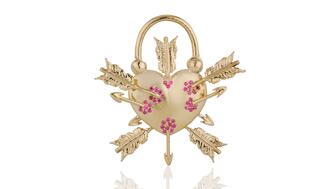
From heart motifs to pink pearls, Valentine’s Day is filled with jewelry imbued with love.

Prosecutors say the man attended arts and craft fairs claiming he was a third-generation jeweler who was a member of the Pueblo tribe.

New CEO Berta de Pablos-Barbier shared her priorities for the Danish jewelry company this year as part of its fourth-quarter results.
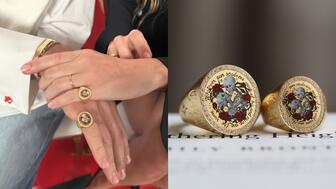
Our Piece of the Week picks are these bespoke rings the “Wuthering Heights” stars have been spotted wearing during the film’s press tour.
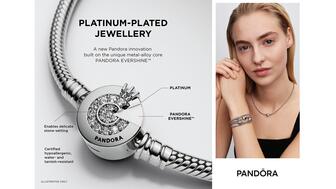
The introduction of platinum plating will reduce its reliance on silver amid volatile price swings, said Pandora.













